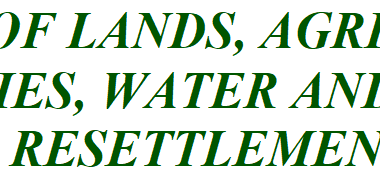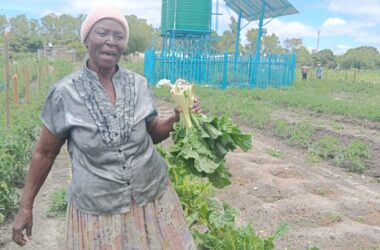Minister challenges developed countries
By Conrad Mwanawashe
Zimbabwe requires increased access to adequate financial support to implement adaptation and mitigation strategies to achieve goals set in the revised Nationally Determined Contribution, according to the Minister of Environment, Climate, Tourism and Hospitality Industry, Nqobizitha Mangaliso Ndhlovu.

“We urgently require predictable, adequate and accessible resources from the international community. I hope that developed countries will be able to deliver on the long-awaited promise to raise at least US$100 billion every year in climate finance to support developing countries’ transition to low carbon and climate resilient development pathways. It is my hope that landlocked developing countries will be assisted in accessing support for enhanced climate action” said Ndhlovu.
He was presenting a paper on “Enhancing Capacity of Landlocked Developing Countries to Address Climate Change and water-related challenges during COVID-19 era: Experiences and Solutions” during a Side Event at the UN Climate Change Conference COP26 recently.
“We also require affordable and better technologies – to strengthen adaptation in agriculture and water sectors; to build resilient infrastructure in particular roads; and to accelerate energy transition.
“We need capacity building support. For example, towards identifying and preparing bankable projects to secure financial resources for climate change adaptation and mitigation needs and national capacities to monitor progress that we are making on climate action,” said Ndhlovu.
Zimbabwe has made efforts to adapt and mitigate the impact of climate change including developing supportive policies and strategies that include the National Climate Policy in 2017, the National Climate Change Response Strategy in 2014, among others.
Some of the solutions government has implemented also include the development of the National Renewable Energy Policy of 2019, National Agriculture Policy Framework of 2018 and National Biofuels Policy.
In addition, Zimbabwe has communicated its revised ambitious Nationally Determined Contribution to the UNFCCC together with the Low Emissions Development Strategy. The revised NDC commits to a 40% economy wide per-capita greenhouse gas emissions reduction target by 2030 and includes an adaptation component.
“We have made significant progress in our National Adaptation Planning (NAP) process. Among the priorities in the NAP process and the revised Nationally Determined Contribution’s adaptation component are early warnings and disaster risk reduction, climate smart agriculture, climate resilient infrastructure development, and resilient and sustainable water resources development,” said Ndlovu.
Furthermore, Zimbabwe is finalizing the development of the Water Resources Masterplan to guide water resources development and management. The process incorporated future climate scenario projections to guide water resources development and management. The masterplan acknowledges the projected increased rainfall variability against an increasing demand for water and proposes measures such as sustainable catchment management, afforestation and reforestation, rainwater harvesting, wetlands conservation, efficient water resources utilization and waste water re-use and recycling.
Climate change solutions that Zimbabwe is promoting for scaling up and replication include:
- Climate-smart rain-fed agriculture
- Promotion of “Pfumvudza/Intwasa” which is a conservation practice that promotes water use efficiency and enhancing soil moisture management on rain-fed lands;
- Increased use of water-efficient drip irrigation systems
- Promotion of seed and animal varieties that are tolerant to extreme weather events;
- Training of smallholder farmers on rainwater harvesting and moisture conservation. In the water sector – we are promoting rainwater harvesting practices, use of water saving practices, recycling and sinking of boreholes.
- Improved management of wetlands – just this year Zimbabwe adopted a Wetlands Management Policy and Guidelines to enhance the role of wetlands in climate change mitigation and adaptation,
In the energy sector we are promoting ethanol blending, solar water heaters, energy efficiency improvements, increasing use of hydropower generation in the energy mix, and the refurbishment and electrification of the rail infrastructure.











